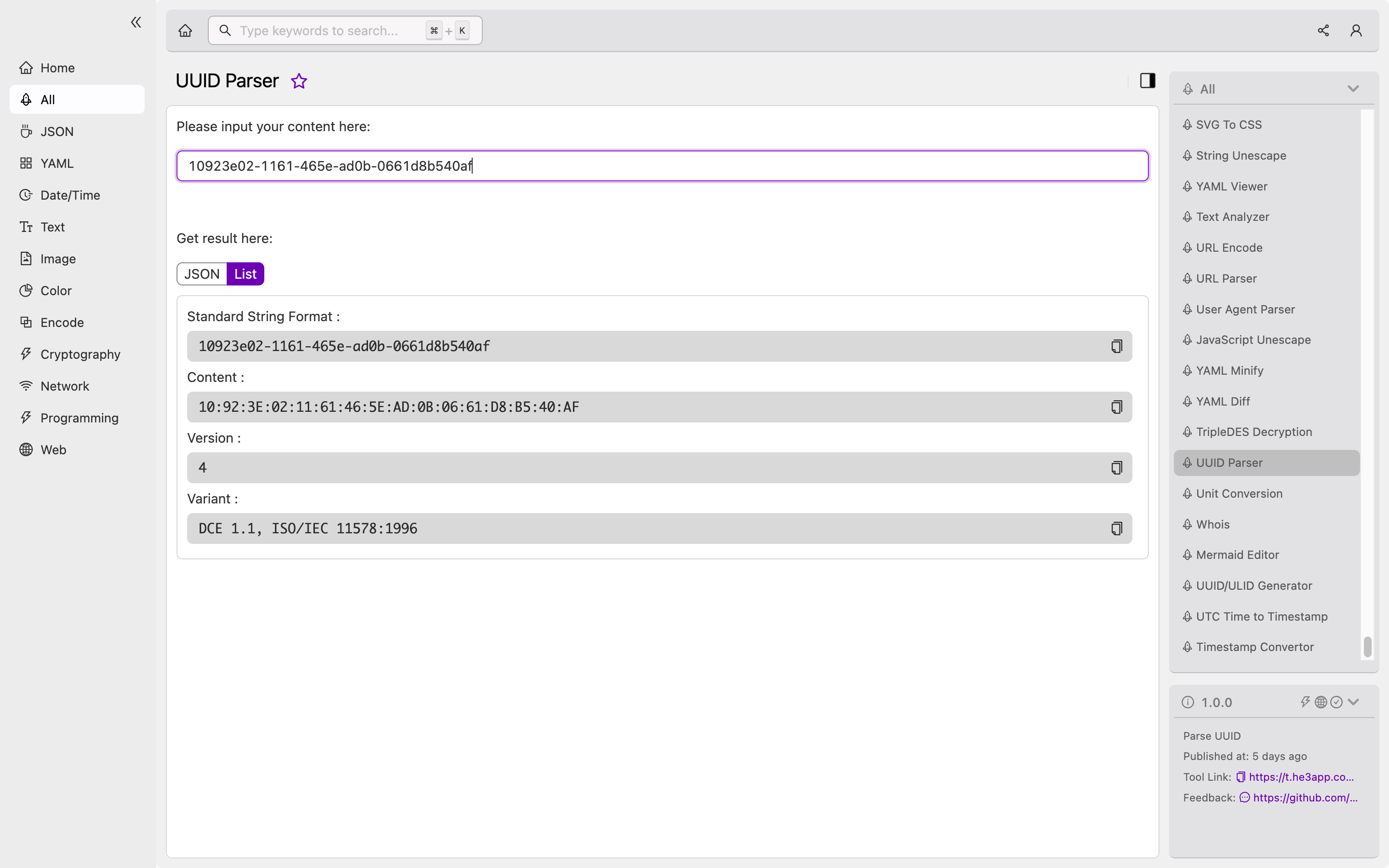Introduction
UUID (Universally Unique Identifier) Parser is an invaluable tool for developers as it simplifies the process of parsing UUIDs. In this article, we’ll dive deep into the basics of UUID Parser, including its key benefits, functions, sample code, scenarios where it can be used, and more.
What is UUID Parser?
A UUID is a 36-character hexadecimal string that serves as a unique identifier for objects in various systems. They are used in a wide range of applications, including databases, file systems, transaction processing systems, and more.
UUID Parser is a tool that allows developers to easily parse UUIDs, which can be challenging and time-consuming to do manually. With the help of UUID Parser, developers can automate the process of parsing UUIDs, thus saving time and reducing the chances of human error.
How does UUID Parser work?
UUID Parser uses regular expressions to parse UUIDs into their respective components, including time, version, and node ID. The tool then formats the parsed UUIDs into a user-friendly format that developers can easily use in their applications.
To demonstrate how UUID Parser works, consider the following example:
const uuidParser = require('uuid-parser');
const uuid = 'a1b2c3d4-e5f6-7g8h-9i10-jk11lmnopq12';
const parsedUuid = uuidParser.parse(uuid);
console.log(parsedUuid);The output would be:
{
timeLow: 'a1b2c3d4',
timeMid: 'e5f6',
timeHiAndVersion: '7g8h',
clockSeqHiAndReserved: '9i',
clockSeqLow: '10',
node: 'jk11lmnopq12'
}As you can see, the parsed UUID is separated into its individual components, making it much easier for developers to work with.
Scenarios where UUID Parser is useful
UUID Parser is particularly useful in scenarios where developers need to parse UUIDs from various sources, such as user input, databases, or API responses. By using UUID Parser, developers can ensure that the UUIDs are properly parsed and formatted, which can help prevent issues such as data corruption or invalid UUIDs.
Some common scenarios where developers might use UUID Parser include:
- Parsing UUIDs from user input
- Parsing UUIDs from API responses
- Parsing UUIDs from databases
Key features of UUID Parser
| Feature | Description |
|---|---|
| Automated parsing | UUID Parser automates the process of parsing UUIDs, saving developers time and reducing the chance of human error. |
| Regular expressions | UUID Parser uses regular expressions to parse UUIDs, ensuring that the tool is reliable and can handle a wide range of UUID formats. |
| User-friendly format | Parsed UUIDs are formatted in a user-friendly way, making it easier for developers to use them in their applications. |
Misconceptions about UUID Parser
One common misconception about UUID Parser is that it only works with a specific type of UUID. In reality, UUID Parser is designed to handle a wide range of UUID formats, making it a versatile tool for developers.
Another misconception is that UUID Parser is difficult to use. However, the tool is actually quite easy to use, even for developers with minimal experience parsing UUIDs.
Frequently Asked Questions
Q: Can UUID Parser handle non-standard UUID formats?
A: Yes, UUID Parser is designed to handle a wide range of UUID formats, including non-standard formats.
Q: Does UUID Parser work with all programming languages?
A: UUID Parser is available for a wide range of programming languages, including JavaScript, Python, and Java.
How to Use UUID Parser
To use UUID Parser, developers can either write their own parsing code using regular expressions or use a third-party library like uuid-parser for their preferred programming language. Or you can use UUID Parser tool in He3 Toolbox (https://t.he3app.com?j76d ) easily.

Conclusion
UUID Parser is an invaluable tool for developers that simplifies the process of parsing UUIDs, saving time and reducing the chance of human error. By using UUID Parser, developers can easily parse UUIDs from various sources and ensure that the UUIDs are properly formatted. If you’re a developer who frequently works with UUIDs, UUID Parser is definitely worth checking out.
References:
